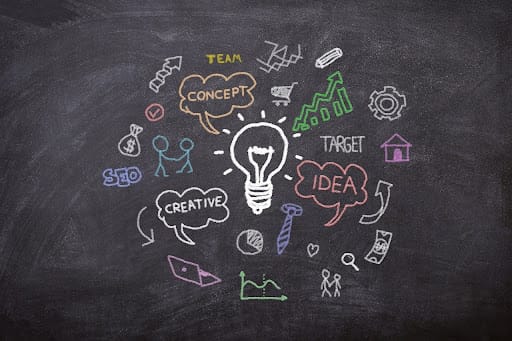The two terms, “branding” and “marketing” are commonly used interchangeably, and as a strategic branding agency, we get asked about it all the time. But, what does each actually mean? Is one concept more important than the other? As businesses begin to understand the utter importance of each of these and devote more of their budget towards this sector, understanding the difference is key.
What is Branding?
Marketing is a more well-known term than branding. However, what most people do not realize is that you cannot have marketing without first establishing a brand. Branding is the process of creating an identity for a business, focusing on the target audience and core values to be portrayed. So, where did branding come from and where is it headed?
A Trip Down Memory Lane
Branding has been around for decades. After all, it is the core of every business. Establishing a long term brand is not possible without knowing who you are as a company and where you want to progress. The earliest examples of branding date back to branding cattle. While this might seem like an odd example, it is exactly branding at its simplest. Farmers would “brand” their cattle to assert ownership, helping the public distinguish them from other livestock. As the years have gone on and increased in competition, the need for branding has become increasingly important. The only way to stand out is if you have a core brand image, mission, and business. Authentic brand building is all about how people perceive you and the relationship they create with you. Without a reputable brand, creating long lasting relationships with customers is not possible.
Key Elements of Branding
- Brand Identity: Brand identity is overall how you are perceived as a business. It includes your logo, color scheme, typography, and visual elements that create a recognizable look. A strong brand identity ensures consistency across all touchpoints, making your business easily identifiable and memorable.
- Brand Tone & Personality: The tone and messaging that shape how your audience relates to you. Whether your brand is playful, professional, authoritative, or friendly, this voice should be consistent in all forms of communication.
- Brand Values & Mission: The core beliefs and purpose behind your company. These elements define why your business exists beyond making a profit and help attract customers who resonate with your principles. These should be easily accessible by your audience.
- Customer Experience: Every interaction a customer has with your brand, from website navigation to customer service. A strong brand ensures a seamless, positive experience that fosters trust and long-term loyalty.
- Brand Positioning: Brand positioning is where your brand stands in the marketplace compared to competitors. Effective positioning helps differentiate your brand and clarifies why consumers should choose you over competing brands.
- Emotional Connection: Emotional connection is at the core of Fix & Form. We are driven by creating human-centered connections because we understand that how customers feel about your brand on a deeper level forge strong emotional ties, making products or services irreplaceable in the minds of clients.
- What Branding Means for You: Branding is the core of your business and who you are as a person. It is your character, what you believe what you value, and how you portray yourself. In a business aspect, this could be your logo, a visual recognition, a slogan, a sound indicator, or your mission statement, concretely describing who you are. Personally, your brand is simply who you are. What is your identity? What are your unique qualities that help you stand out against others. How do you present yourself? Answering all of these questions is key to building a reputable brand both on a professional and personal level. Intentionally taking the time to craft your brand in a transparent way, such as a strategic branding agency, will be the difference between success and failure.
What is Marketing?
Marketing in short is the are of promoting and selling products or services. However, marketing is so much more than a simple definition, with a plethora of complex layers. Marketing has rapidly evolved throughout the decades and has no intention of losing momentum anytime soon.
A Trip Down Memory Lane
Marketing was first really used as propaganda, heavily weighted in slogans, jingles, everyday language. As one can imagine, it was minimal, mostly in print ads and door-to-door sales. However, after the industrial revolution, when mass media, radios, computers, and televisions began to take over, so did marketing. The world shifted rapidly, with businesses skyrocketing. For example, Coca Cola is a classic example of a brand that used marketing to skyrocket its business. Coca Cola started by advertising on simple things such as napkins and clocks and eventually devoted a large portion of its budget to commercials and innovative product designs. In fact, in 2011, Coca Cola was named Marketer of the Year. Coca Cola is one of may business that cracked the code of marketing. They all learned to shift with the revolutionizing world, and eventually, social media influencing, digital analytics and artificial intelligence started to take over. The rapid digital age is where marketing falls currently, with data and AI leading the way.
Key Elements of Marketing
Marketing is a broad world, yet finding your niche is utterly important. The key elements of marketing are:
- Advertising: Advertising includes everything that is a paid campaign that increases your brand visibility.
- SEO & Digital Marketing: SEO, or search engine optimization, is anything that increases your discoverability and organic traffic such as keywords, optimizing websites and blogs, and creating online content that will rank higher in search engines.
- Social Media & Content Creation: Social media and content creation is what is typically thought of when you think of marketing. It involves the specific content that is created, the storytelling, the posts, and overall social media presences a business has on platforms such as Instagram, Linkedin, or websites.
- Email Marketing: Anyone with an email has been a target of email marketing, receiving campaigns from a variety of businesses trying to encouraging to become a new customer. Email marketing is personalized, automated and consistent.
- Sales Strategy: Sales strategy in marketing refers to the financial side of marketing, implementing specific goals of how to turn marketing efforts into real revenue streams. This includes metrics such as retention rate, customer lifetime value, conversion rate, and customer acquisition cost.
- What Marketing Means for You: Just as marketing is nothing without a brand, you brand is nothing without marketing. Marketing is the action that grows your business and takes your brand to the next level. However, it is not just any kind of marketing, any kind of social media or any kind of advertising. There is must be a marketing strategy behind every move you make. Further, marketing is your competitive advantage, both personally and professionally. Marketing does not just apply to your business, it applies to you as an individual. For example, any job that you get, you had to market yourself to get there. Your resume, cover letter, and interview are all avenues of marketing yourself. You are the brand, and your materials are your marketing tools.
Is Marketing or Branding More Important?
Now that you know the difference, you may be wondering which one is more important? The answer is both. Branding is the basis of your business, and marketing is what boosts your brand.
Implementing Branding and Marketing in Your Business
The path to ultimate success is seamlessly implementing branding and marketing into your business. The first step is to authentically build your brand, finding your character and who you are as a company. The second is to implement a marketing strategy that takes your brand to the next level, sharing who you are and why you should be in business. As discussed in our Blog “The Truth Behind Transparency”, Fix & Form has transparent business cards. Our core brand is that we are a transparent strategic branding agency motivated on human-centered connections. We use transparent business cards to market this brand, emphasizing our core values and what differentiates us from the competition.
The Future of Branding and Marketing
As Joe Chernov quoted, “Good marketing makes the company look smart. Great marketing makes the customer feel smart.” Branding and marketing is skyrocketing in the modern world. However, boundaries of ethics are constantly being crossed, causing an uproar and negative tainted image on marketing. Now more than ever it is utterly important to properly use AIDA: Attention, Interest, Desire, Action. First, authentically build your brand, establishing who you REALLY are, not who the world wants you to be. Then, appropriately and ethically market yourself.
While branding and marketing are terms used interchangeably, they each serve their own purpose and are crucial to the success of any business. Additionally, they are utterly important to you as an individual and your personal career. Learning and implementing what it means to have a brand and market that brand is the key to success in a modern world. Need help branding yourself or your business? Let’s connect, and build a brand that you are proud of!
Happy Branding and Marketing!



